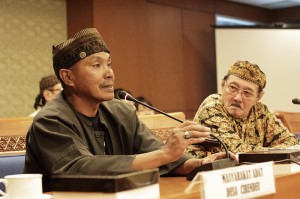 AMAN and representatives of three indigenous communities from western Java appeared before the Special House Committee in a public hearing on the draft Bill on the Recognition and Protection of the Rights of Indigenous Peoples today.
AMAN and representatives of three indigenous communities from western Java appeared before the Special House Committee in a public hearing on the draft Bill on the Recognition and Protection of the Rights of Indigenous Peoples today.
The hearing, at Indonesia’s national parliament, took place after a formal request from AMAN in an attempt to expedite consideration of the bill which has sat in the lower house since 2011.
The Committee heard from the heads of communities from Cigugur, Cirendau and Kampung Naga, as well as Rukka Sombolinggi, Deputy Secretary General of Advocacy of Policy, Law and Politics at AMAN.
Delegates from the community spoke of the need to protect culture and the beliefs of indigenous peoples. ‘A great nation is a nation that values its culture. Where is the evidence [of that in Indonesia]?’ Mr Ade Suherlin, representative from Kampung Naga, asked. ‘We still maintain our indigenous identity in the midst of the big city on this island of Java,’ he said.
Delegates spoke also of the importance and basic human right of recognition. ‘We are not begging for recognition. It is the state’s obligation to its people,’ said Ms Dewi Kanti, representative from Cigugur.
Rukka Sombolinggi from AMAN delved deeper by explaining the need for legislation that aims to protect the rights of indigenous peoples to include protection of their material rights including land and natural resources, as well as the rights of indigenous peoples to their culture, tradition and spirituality.
She also called for the establishment of a special commission for indigenous peoples at the national and provincial or local level as an independent body responsible for indigenous peoples’ rights and interests.
Responding to the indigenous peoples representatives, Mr Nasrudin, member of the Special House Committee was sympathetic. ‘We recognised our independence nearly 70 years ago, but there are still many Indonesians who do not yet have freedom.’
However, while he acknowledge that the bill was initiated by the parliament, he noted that because of its complexity and that it involved many ministries, the process was unlikely to be completed soon.
Of the 30 members of the House Special Committee only four were present.

